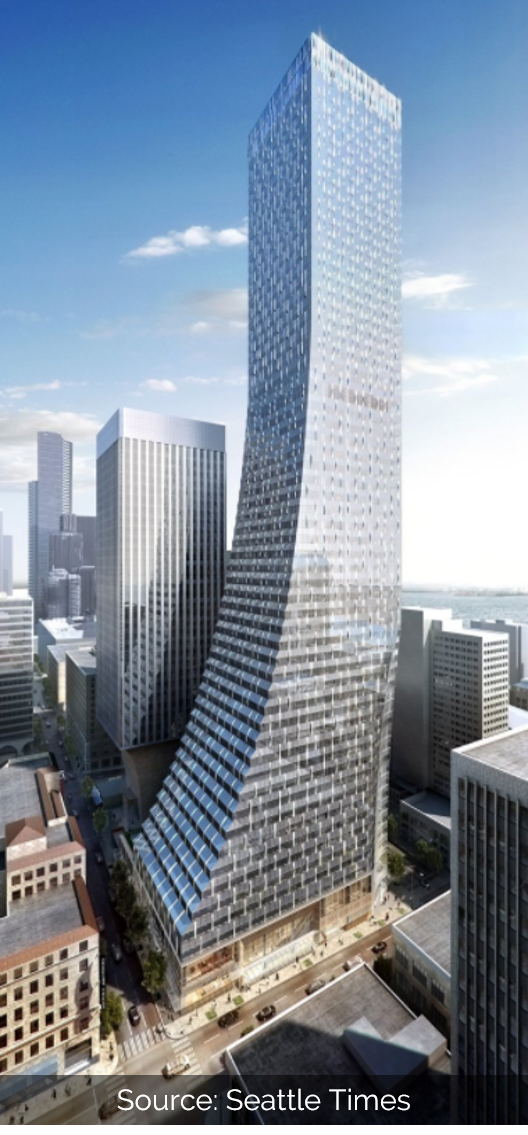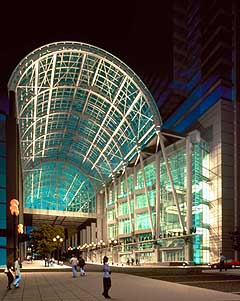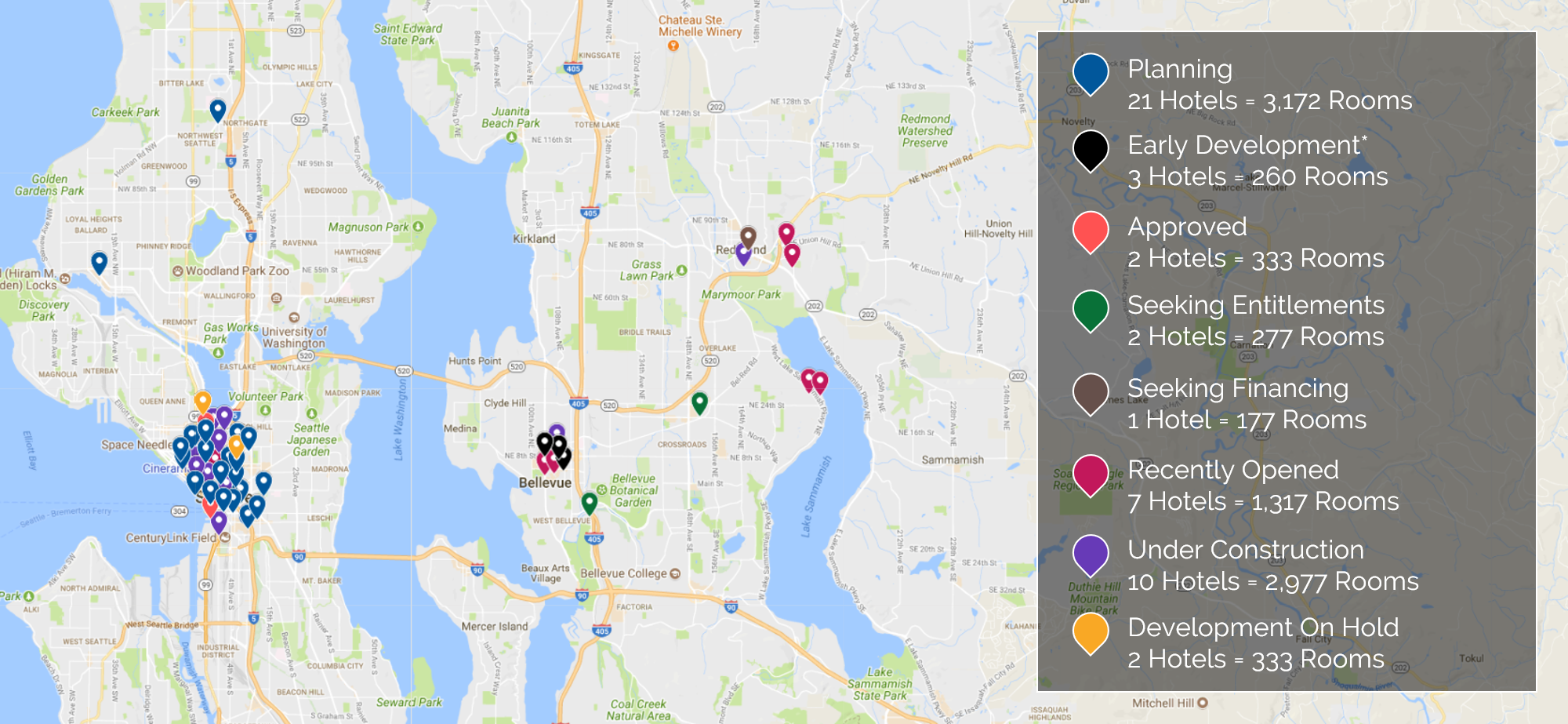
By Kirsten Z. Smiley
My, oh, my! The famous catchphrase coined by Seattle Mariners’ longtime sportscaster, Dave Niehaus, is ever so fitting as we look at how Seattle has changed over the last ten years. Seattle enjoys a diverse economy rooted in manufacturing, biotechnology, high technology, telecommunications, health care, and tourism. Metro Seattle, especially Downtown Seattle and Bellevue, is experiencing a period of exponential growth anchored by tech giants, such as Amazon, Microsoft, Google, and Expedia. The area is also home to several Fortune 500 companies, such as Boeing, Costco, PACCAR, Weyerhaeuser, Starbucks, and Nordstrom. Moreover, other key employers in the area, such as the University of Washington, Bill & Melinda Gates Foundation, and Fred Hutchinson Cancer Research Center, strongly influence the local and regional economies. Today, Seattle is among the fastest-growing cities in the U.S., and the commercial developments in the area have fueled unprecedented hotel demand growth, spurring new hotel construction throughout the market.
Major Businesses & Developments
Microsoft Corporation is an American multinational technology company that develops, manufactures, licenses, supports, and sells computer software, consumer electronics, personal computers, and services. In 1986, Microsoft moved into its headquarters office in the Redmond suburb of Seattle and began its journey to become one of the Fortune 100 companies; its expansions have drawn tens of thousands of talents to the area and have cultivated a tech-friendly environment in Seattle, now considered a technology hub and home to numerous startup companies.

Another web-based tech company that will join Amazon in Downtown Seattle is Expedia, which will relocate its headquarters and 3,500 employees from Bellevue to Seattle by 2019. Additionally, several Silicon Valley high-tech companies, such as Google and Facebook, have a strong presence in Seattle. Google, with its major presence in Kirkland, announced plans to relocate its cloud division, currently located in Fremont, to the South Lake Union neighborhood of Downtown Seattle by 2019. The new campus, which broke ground in May 2017, will occupy 607,000 square feet of office space.
Seattle's central waterfront, which stretches nearly two miles along the west side of the city, is amid a multibillion-dollar revamping project. One of the major components is the replacement of the Alaskan Way Viaduct, which is scheduled for completion in 2019. In addition, the existing seawall, which does not meet current safety standards, will be replaced. These two projects will create a significantly different landscape, with a pedestrian promenade connecting the waterfront to Downtown Seattle. Other projects will include an expansion of the Pike Place Market and a new Overlook Walk. The Seattle waterfront project is anticipated to create opportunities for the city to capture more tourists and businesses.

The expansion of Amazon, the growing numbers of startups, and the increasing attractiveness of Downtown have resulted in a historically high number of developments in Downtown Seattle. Aside from the CBD, other neighborhoods, such as the Pioneer Square and SoDo, are experiencing a period of revitalization. Timber REIT Weyerhaeuser recently moved its headquarters to the Pioneer Square neighborhood from Federal Way. SoDo, an industrial district south of the CBD, houses the largest concentration of industrial facilities in Seattle and is home to two sport stadiums, the headquarters for Starbucks, and Harbor Island, the largest container port facility in the Pacific Northwest. While industrial uses remain to be the focus of the neighborhood, the construction of new office buildings and a 23-story Embassy Suites by Hilton hotel are underway. According to a report published by Downtown Seattle Association mid-year 2017, 74 major projects were under construction in Downtown Seattle, with 150 more in the pipeline,[2] which should add a significant amount of multi-unit residential, office, and retail space, as well as new hotel supply, over the next five years.
Airport
The Seattle-Tacoma International Airport is the regional air hub of the Pacific Northwest and is served by various domestic and international commercial airlines. The airport handled over 45 million passengers in 2016, compared to the 31 million (rounded) in 2010. In response to the growing passenger traffic, the airport is undergoing a series of renovations and expansions, including opening a new International Arrivals Facility, installing a new baggage system, and renovating the airport's 40-year-old North Satellite concourse. Furthermore, as Seattle-Tacoma International Airport passenger counts continue to rise, the airport's master plan includes an estimated $10-billion expansion project that will add 51 additional aircraft gates over the next 20 years to sustain growth. In addition, the new, 300,000-square-foot Federal Aviation Administration's (FAA) regional headquarters office is under construction and scheduled for completion in 2018. This location will serve as the new home of the Northwest Mountain Regional FFA office.
Tourism
Seattle’s economy has been bolstered by strong tourism levels. King County welcomed roughly 39 million visitors in 2016, and visitor expenditures reached $7 billion that year, a 3.8% increase from 2015. Many visitors come to the area to take an Alaskan cruise during the summer months. In 2016, 203 vessel calls originated from Seattle's cruise terminals, carrying 980,000 passengers (rounded). The passenger count is forecast to surpass one million in 2017. According to Port of Seattle, the cruise industry generated approximately $459 million in business revenue in 2016.[3] In addition, Seattle also hosts a wide variety of cultural activities, concerts, bazaars, and festivals. Safeco Field, home to the Seattle Mariners Major League Baseball team, and CenturyLink Field, home to the NFL’s Seattle Seahawks, are both located in the SoDo neighborhood. In 2017, Adam Silver, the National Basketball Association’s commissioner, indicated that the NBA is planning to expand in the near future and that Seattle is one of the potential homes to a new NBA franchise. On the collegiate level, the University of Washington draws a significant number of visitors during the football season.
Challenges
While Seattle is on the growth trajectory, the city has its own challenges. Seattle has some of the toughest labor laws, which affects the hospitality industry. In September 2016, Seattle passed a law that requires a 14-day window for setting the employee work schedule. Additionally, employers are required to offer more hours to existing employees before hiring new workers. Furthermore, the skyrocketing home prices and the increasing homeless population are also part of the growing pain. As of October 2017, the median home price in Seattle reached $725,000.
Bellevue Snapshot

New Supply
The growth of the market has prompted new hotel development. The following table illustrates new and proposed hotel supply in the Seattle-Bellevue-Redmond market.

Conclusion
The Seattle metropolitan area is one of the top ten metro markets in the United States experiencing the most supply growth. According to STR, there were 4,254 rooms under construction as of October 2017, equating to 9.4% of the existing hotel rooms; nevertheless, year-to-date through October 2017 data show 6.2% RevPAR growth coinciding with the 2.9% supply growth. STR noted that Seattle will be one of two U.S. markets forecast to register growth in the range of 5% and 10% for full-year 2017, while most other major markets will grow in the range of 0% to 5%. The depth and strength of demand generators spanning the Seattle metropolitan area have supported the current strong market dynamics. While the entrance of many new hotels remains to be a concern for local hoteliers, the exponential growth of Amazon, the revitalization of Downtown Seattle, and the increasing attractiveness of Bellevue are anticipated to sustain future demand growth in the market.
[1] http://www.seattletimes.com/business/amazon/thanks-to-amazon-seattle-is-now-americas-biggest-company-town/
[2] https://cdn.downtownseattle.org/files/research/development-guide.pdf
[3] https://www.portseattle.org/Cruise/Documents/2017_cruise_factsheet.pdf

